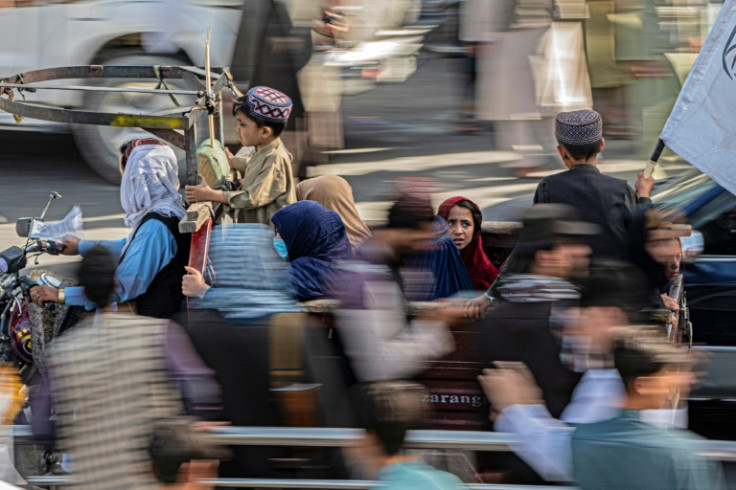Women And Girls In Afghanistan Feel 'Forgotten' and 'Abandoned' By World
As the gender apartheid persists in Afghanistan, women and girls are losing hope and Former Minister of Women's Affairs Hasina Safi calls for international support.

In a recent interview, Human Rights Activist and Former Minister of Women's Affairs Hasina Safi, spoke of the international humanitarian support given to Afghans living under the Taliban rule.
Safi explained that, with the Israel-Gaza war dominating the media, many people in Afghanistan feel "forgotten" and "abandoned" by the world.
The 49-year-old went on to say: "I will not say there is just a 'sense of abandonment' – there is abandonment. Period."
Safi was forced to step down from her role as Minister of Women's Affairs after the Taliban regained power in 2021. The Taliban replaced the ministry that worked towards achieving gender equality, with "the ministry of guidance and preaching".
Safi called the international response to the Afghanistan crisis, "confused" and recognised that the current humanitarian support plan must be adapted.
"The international community do not know what to do. There are conferences, there are events, there are various kinds of programmes. But there is no practical result which can really help the disappointment inside Afghanistan for those who are at risk and deprived," she declared.
This month, Pakistan ordered all undocumented Afghan asylum seekers to leave the country by November this year.
For the past two years, Afghan nationals have been forced to abide by strict Sharia laws and a strict apartheid system that has been implemented by the Taliban.
If the civilians fail to conform to their extreme leaders, they are victims of physical punishments and prison sentences.
In regard to the discipline conducted by the Taliban, Safi explained: "Sometimes these are about the clothes they wear, sometimes it's about make-up, sometimes about their mobility outside"
#Taliban whip children and men in public and call it "enforcement of #Islamic_Sharia".
— Sajjad Nuristani (@SajjadNuristan) June 5, 2023
Cutting hands, stoning, killing, Demolition of the wall above the suspect's head,hanging corpses in crowded places and whipping in public are some of the usual methods of Taliban punishment. pic.twitter.com/mIK9mcFWes
Afghanistan was also hit by three earthquakes this month, which resulted in a huge number of casualties and the death toll surpassing 3,000.
The UNAMA, United Nations Assistance Mission in Afghanistan, also reported that since the Taliban retook power in August 2021, there have been at least 3,774 civilian casualties due to violence.
The UNAMA also reported that more than 1,000 of the casualties led to deaths among innocent civilians in Afghanistan.
More than 90 per cent of those who died in the earthquakes, which each rocked the country at a minimum of 6.3 magnitude, were women and children.
Experts noted that the Taliban's restrictions on women's movement, which ultimately forced them to stay at home, led to a huge female death toll.
Speaking of the atrocities performed by the Taliban, Safi said: "The situation is very disappointing. Day by day, instead of introducing mechanisms or coordination in finding ways of supporting people, there are decrees, there are directives – one after the other."
pic.twitter.com/2BMa2xslYO
— Daily Trending News (@David10061976) October 9, 2023
The moment a young child was found alive under the rubble after a magnitude 6.3 earthquake hit western Afghanistan on Saturday.#AfghanistanEarthquake #Afghanistan #earthquake
After Western forces withdrew from the territory in Afghanistan, the aspirations of women and girls were forbidden as they lost their rights to education and employment.
"Ensuring higher and higher-secondary education of girls and women is another key priority," Safi urged.
In order to abolish the normalcy and familiarity of Afghanistan being governed by the Taliban, Safi acknowledged that a "strategic revisit of the support of the international community to the people of Afghanistan is required".
According to the UK government, the UK has played a significant role in providing humanitarian aid to Afghanistan and doubled the amount of aid being sent to Afghanistan in August 2021.
The UK government also claim that they are working towards empowering women and girls in Afghanistan and have welcomed more than 24,600 Afghan nationals into the UK.
Despite the UK reporting their support to Afghan civilians, the situation in Afghanistan has remained catastrophic, and chaotic and acts as an environment that sets out to wipe women from society.
"There should be a consolidated report of all the initiatives happening in the last two years – covering [perspectives and experiences] within Afghanistan, the diaspora, the international community – which puts their strategic vision on the table," Safi concluded.
© Copyright IBTimes 2025. All rights reserved.






















